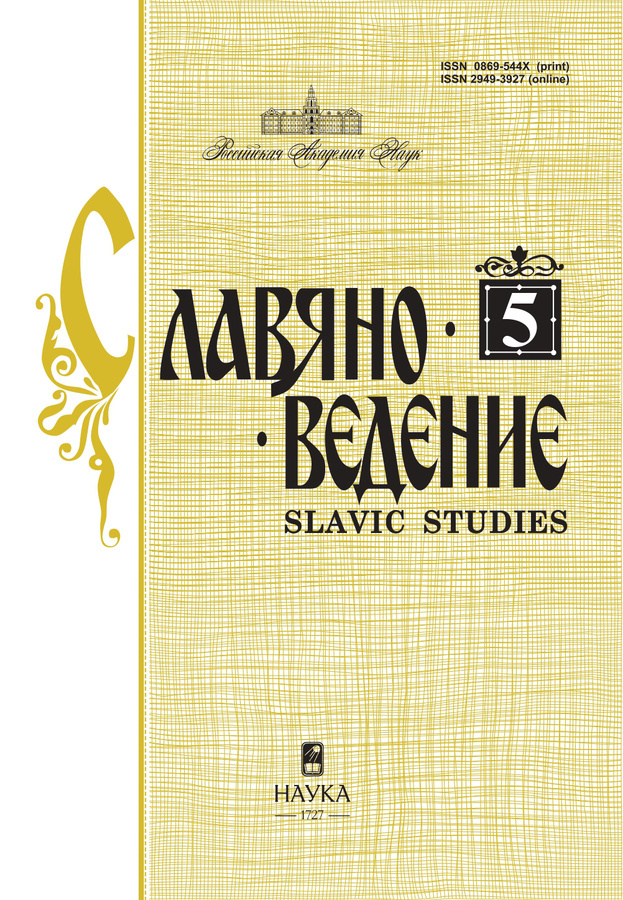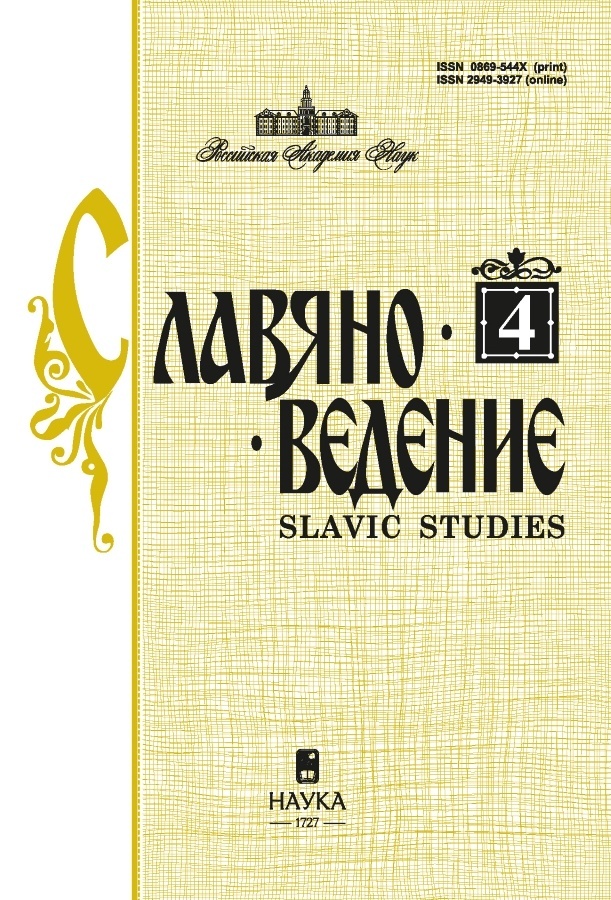"I Wasn't Speaking About Myself!": Michał Głowiński's Late Holocaust Surviver's Testimony
- Authors: Adelgeim I.Y.1
-
Affiliations:
- Institute of Slavic Studies of Russian Academy of Sciences
- Issue: No 4 (2025)
- Pages: 81-92
- Section: * * *
- URL: https://modernonco.orscience.ru/0869-544X/article/view/696153
- DOI: https://doi.org/10.31857/S0869544X25040064
- EDN: https://elibrary.ru/UZYMNS
- ID: 696153
Cite item
Full Text
Abstract
The article is devoted to the autobiographical prose of Michał Głowiński, a major Polish literary scholar and one of the representatives of the «late» Holocaust survivers’ testimonies (1998–2016). For the first time, Głowiński decided to tell about his experience of life in the Warsaw ghetto and on the «aryan side» only after half a century of silence. The reasons that prevented the systematic, consistent verbalization of the trauma (necessary to overcome it) during the socialist period are examined (lack of a safe environment); the peculiarities of Głowiński's narrative and their artistic and psychological prerequisites and tasks are analyzed (including the distinctive differences between texts marking different stages of trauma work). The fragmentary nature of the narration and its connection with the specificity of traumatized childhood memory, separated from the moment of articulation by a temporal distance, are investigated. The mosaicism of the narrative is shown to be evidence of the limited expressiveness of the Holocaust and the continuity it disrupted al well. The autopsychotherapeutic significance of reconstructing not only facts but also emotions is emphasized. The tasks of introducing metatext as an instrument of dialogue with the self-child, unifying biography, and gaining power over its meanings are analyzed. Głowiński's autobiographical narrative (reconstructing and conceptualizing events of the past) is ultimately aimed at integrating fragments of the text of life into a single text of fate. Processing trauma through autobiographical narrative also allows (therapeutically) transforming the meaning of tragedy.
About the authors
I. Ye. Adelgeim
Institute of Slavic Studies of Russian Academy of Sciences
Author for correspondence.
Email: adelgejm@yandex.ru
ORCID iD: 0000-0001-5208-0848
Moscow
References
- Adel’geym I.Ye. Psikhologiia poėtiki. Autopsikhoterapevticheskie funktsii khudozhestvennogo teksta (na materiale pol’skoi prozy 1990–2000-kh gg.). Moscow, Indrik Publ., 2018, 648 p. (In Russ.)
- Adel’geim I.Ye. «Poetizirovannaia indul’gentsiia». Fenomen uspekha romana Andrzeja Szczypiorskogo «Nachalo». Slavianskii al’manakh, 2021, no. 1–2, pp. 346–364. (In Russ.)
- Assmann A. Między historią a pamięcią. Antologia. Warszawa, Uniwersytet Warszawski, 2013, 323 p.
- Benjamin W. O poniatii istorii. Novoje literaturnoje obozrenije, 2000, no. 46, pp. 81–90. (In Russ.)
- Bojarska К. Wydarzenia po wydarzeniu. Białoszewski – Richter – Spiegelman. Warszawa, IBL PAN, 2012, 364 p.
- Cyrulnik B. Ratuj się, życie wzywa. Warszawa, Czarna Owca, 2014, 256 p.
- Faustova A.G. «Trudno vspomnit’ i nevozmozhno zabyt’»: mekhanizmy funktsionirovaniia travmaticheskoi pamiati. Lichnost’ v meniaiushchemsia mire: zdorov’je, adaptatsiia, razvitije, 2024, vol. 12, no. 3 (46), pp. 193–206. (In Russ.)
- Gilmore L. Przypadki graniczne: trauma, autoreprezentacja i prawne formy tożsamości. Antologia studiów nad traumą. Kraków, Universitas, 2015, pp. 359–376.
- Głowiński M. Wielkie zderzenie. Teksty Drugie, 2002, no. 3, pp. 199–211.
- Gracheva L.V. Affektivnaia pamiat’ po K.S. Stanislavskomu i uprazhneniia N.V. Demidova. Vestnik Akademii russkogo baleta im. A.Ia. Vaganovoi, 2019, no. 2 (61). Available at: https://cyberleninka.ru/article/n/affektivnaya-pamyat-po-k-s-stanislavskomu-i-uprazhneniya-n-v-demidova (accessed: 25.01.2025). (In Russ.)
- Grynberg H. Pokolenie Szoa. Odra, 2002, no. 4, pp. 37–49.
- Hermann J. Travma i istselenije. Posledstviia nasiliia – ot ab’iuza do politicheskogo terrora. Moscow, Bombora Publ., 2024, 640 p. (In Russ.)
- Kirchner H. Ścianki kryształu. Kilka myśli o literaturze świadectwa. Poetyka. Polityka. Retoryka, еd. Bolecki Wł., Nycz R. Warszawa, Instytut Badań Literackich, 2006, pp. 61–70.
- Kolk van der Bessel A., Hart van der Onno. Natrętna przeszłość: elastyczność pamięci i piętno traumy. Antologia studiów nad traumą. Kraków, Universitas, 2015, pp. 139–174.
- Kowalska-Leder J. Doświadczenie Zagłady z perspektywy dziecka w polskiej literaturze dokumentu osobistego. Wrocław, IBL PAN, 2009, 366 p.
- Krawczyńska D. Własna historia Holokaustu. O pisarstwie Henryka Grynberga. Warszawa, IBL PAN, 2005, 231 p.
- Krawiel M. Michał Głowiński: literaturoznawca i pisarz Zagłady. Białostockie Studia Literaturoznawcze, 2017, no. 10, pp. 209–221.
- Krupa B. Opowiedzieć Zagładę. Polska proza i historiografia wobec Holocaustu (1987–2003). Kraków, Universitas, 2013, 568 p.
- Kurkiewicz J. Punkty pamięci. Tygodnik Powszechny, 2003, no 24. Available at: http://www2.tygodnik.com.pl/ksiazki/24/ksiazki03.php (accessed: 03.01.2025).
- LaCapra D. Pisanie historii, pisanie traumy. Pamięć Shoah. Kulturowe reprezentacje i praktyki upamiętnienia, еd. Majewski T., Zeidler-Janiszewska A., Wójcik M. Łódź, Officyna, 2009, 1008 p.
- LaCapra D. Trauma, nieobecność, utrata. Antologia studiów nad traumą. Kraków, Universitas, 2015, pp. 59–107.
- Langer L. Scena pamięci. Rodzice i dzieci w tekstach i świadectwach Holokaustu. Literatura na Świecie, 2004, no. 1–2, pp. 125–139.
- Leociak J. Grynberg niebanalnie o Głowińskim. Odra, 2002, no. 6, pp. 64–66.
- Łysak T. Trauma – od genealogii pojęcia do studiów nad traumą. Antologia studiów nad traumą. Kraków, Universitas, 2015, pp. 5–30.
- Matuszewski R. Czarne sezony. Więź, 1998, no. 8, pp. 207–211.
- Nurkova V. Svershennoje prodolzhajetsia: Psikhologiia avtobiograficheskoi pamiati lichnosti. Moscow, URAO Publ., 2000, 320 p. (In Russ.)
- Pennebaker J. Telling Stories: The Health Benefits of Narrative. Literature and Medicine, 2000, no. 19, pp. 3–18.
- Pietrych K. (Post)Pamięć Holocaustu – (meta)tekst a etyka. «Fabryka muchołapek» Andrzeja Barta a «Byłam sekretarką Rumkowskiego» Elżbiety Cherezińskiej. Inna literatura? Dwudziestolecie 1989–2009, vol. 1, еd. Andres Z., Pasterski J. Rzeszów, Wydawnictwo Uniwerstytetu Rzeszowskiego, 2010, pp. 203–225.
- Pilichiewicz K.K. «Widziałem ezgekucję». Gettowe błyski pamięci Michała Głowińskiego. Żydzi wschodniej Polski, seria IX: Dziecko żydowskie. Białystok, Wydawnictwo Prymat Źródło, 2021, pp. 279–289.
- Sokołowska K. Dokumentalność a figuratywność w pamiętnikach dzieci Holokaustu. Uwag kilka. Ślady obecności, ed. Buryła Sł., Molisak A. Kraków, Universitas, 2010, pp. 293–315.
- Szczepan A. Realizm i trauma – rekonesans. Teksty Drugie, 2012, no. 4, pp. 219–230.
- Tomczok M. «Opowiadanie jest stałym bytu cieniem». Kilka uwag o kanonie Zagłady w literaturze najnowszej. Narracje o Zagładzie, 2015, no. 1, pp. 75–95.
- Waligóra J. Pamięć i tekst. Wypowiadanie Zagłady w «Czarnych sezonach» Michała Głowińskiego. Annales Universitatis Paedagogicae Carcowiensis. Studia Historicolitteraria, 2009, no. IX, pp. 156–165.
- Wolski P. Zawsze fragment. O polskim literaturoznawstwie i jego kanonie (Zagłady). Narracje o Zagładzie, 2015, no. 1, pp. 62–74.
Supplementary files











